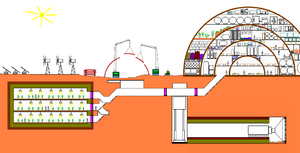Foundation of an Autonomous Colony
|
v · d · eColony Types | |||
|---|---|---|---|
The Foundation of an Autonomous Colony on another cosmic body is one of the most challenging tasks for humanity. Though it requires enormous effort, the goal to expand the influence of mankind throughout the Solar system is worthwhile. This motivation has several aspects. This page covers general issues of an autonomous colony on Mars.

What is an autonomous colony? The main attribute is independence from Earth. Once the colony is set up, it provides a habitat for settlers on the long run, hopefully forever. The second attribute is a planned and indefinitely stable colony that can thrive from local resources. Unlike a mission with planned death the settlers in an autonomous colony have a future for themselves and for their Mars-born children. The ultimate expression of independence from Earth may be the complete political independence of a colony.
I told my kids we'd play after I found what I neeedd. Damnit.
Contents
Organizational Issues
The preparation cost for a mission like this is tremendous. A financial effort estimation helps to get an overview.
Within a small group of colonists, a daily council of all members may be sufficient to address the needs of governance, much in the tradition of the New England town hall meetings. In a growing community some kind of representative democracy may become necessary, although this type of government may not be well suited to a small colony in a hostile environment.
As the number of members in a martian population grows, so will the number of deaths. It will become necessary to conduct funerals.
Medical Issues
Quarantine
Before heading for Mars any crew is quarantined to ensure they do not suffer from infectious diseases. As a result, the Martian colony should be more or less free from pathogenic germs, which saves medical effort. However, for children born on Mars an even more effective vaccination program will be necessary to stimulate the development of Mars-born immune systems.
Inbreeding
The size of the human population must not be too small due to the risk of inbreeding depression. This can be positively influenced through the use of in-vitro fertilisation from genetic stock for the first child born to every colonial family.
Cancer
Increased exposure to radiation may increase the incidence of cancer. Colonists will need shielding from radiation during transport from Earth to Mars and on Mars' surface, due to the thin atmosphere and lack of a planetary magnetosphere.
Medical care
Compared with Earth the limited industrial performance of an autonomous colony does not allow the same level of medical care. High sophisticated accessories for surgery and a great variety of drugs are impossible to produce. Alternatives to standard medicine considered taboo on Earth may be forced upon the growing settlement, such as the use of genetically altered pig organs in emergency transplants.
Open Issues
- Can there be enough energy generated, necessary for infinite maintenance?
- What is the public attitude to such a foundation?
- What skills and technologies are needed to have a small self-sufficient economy rather than a 6-billion-person global economy with its highly interdependent and very specialized jobs and technologies?
| Concepts: | Greenhouse · Settlements · Locations · General |
| Hazards: | Space Weather · Climate · General |
| Technology: | Hi-Tech · Lo-Tech · Energy · Spaceflight science · Communication · General |
| Human Considerations: | Economics · Health · Governance · Trade · Law · Social |






